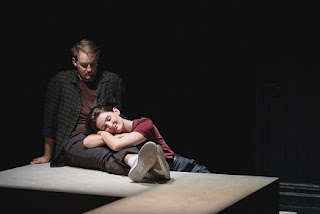I went along to Fringe World for the first time in a couple of years; largely released from my screenwriting duties for major funding deadlines. What struck me most was the quality of the writing in several local productions. This thrilled me no end.
There were two revivals from the top tier of the Perth theatrical scene - Holland St Productions' What Doesn't Kill You [blah blah] Stronger with Tyler Jacob Jones and Erin Hutchinson in scintillating form, accompanied by Joe Louis Robinson; and the ten year anniversary of The Last Great Hunt's FAG/STAG with Will Bartolo and Shaun Johnston in the roles originated by creators Jeffrey Jay Fowler and Chris Isaacs. Superb writing - Jones with Robert Woods in a razor sharp musical comedy; Fowler & Isaacs with wry observational drama.
A trio of original works impressed - The Simple Gift by Andre Victor which quietly reminded us of the power of remembering who you really are through acts of kindness; the raucous and clever Lady Macbeth Played Wing Defence by Crash Theatre Co that more than lived up to the hype with swagger to burn; and Iris Warren's adaptation of Femoid (Vixen Theatre Company) from her original 25 minute TILT piece into a full-blown hour which deepened the exploration of young women having to deal with the repugnant and dangerous Incel culture.
The next production floored me. So much so that my review started with, "I don't know how to review this show." What To Expect When You're No Longer Expecting by Roe Rowe Productions is a striking example of theatre at its most honest - raw, vital, and brave. I cried. For Roe. For a friend. For a lady nearby in tears. I cried because such generosity of spirit is also a gift.
A quick mention to three other shows that featured sharp writing/storytelling - FootyBoy by Wallaby Blue Company with a serious message under the humour including the power of forgiveness; Sarahtonin by Sarah Bowers which engulfed the Leederville Hotel's Red Room in positive vibes; and the unexpected gem of Stand and Deliver by Thanks Tina at the Hayman Theatre.
In the world of community theatre, I was taken with the very funny She Kills Monsters by Darlington Theatre Players which featured excellent production values; Looped at the Old Mill Theatre showcasing a stunning portrayal of real life actress Tallulah Bankhead by Kylie Isaia; and Green Day's American Idiot by Art In Motion Theatre Company for its no holds barred approach.
Speaking of stunning portrayals, Pamela Rabe could only be described as [insert every adjective here including ASTONISHING] in August: Osage County by Black Swan State Theatre Company. I can't recall seeing a better performance on a Perth stage. What I love is that Hayley McElhinney went with her as the fireworks ratcheted up in the second act.
Another kind of performance, equally entrancing, occurred at the Richard Gill Auditorium where Gina Williams gave a powerhouse vocal display with her storytelling, sense of humour, and generosity [I'm seeing a theme here - kindness, forgiveness, generosity] truly outstanding alongside guitarist Guy Ghouse and the WAAPA Contemporary Music Students in the Kalyakoorl Ngalak Warangka (Forever We Sing) concert.
Back to writing (and directing), Rachel McMurray made an auspicious Perth debut with her play Shadow of Doubt by Fine Comb Theatre Company at the Blue Room; a tightly constructed, supremely acted, and smartly presented work.
In terms of presentation I thought the entire design team - Set and Costume Designer Sam Knox, Lighting Designer Peter Young, and Composer and Sound Designer Tim Collins - of the excellent Hoods by Barking Gecko Arts did an outstanding job which allowed actors Joshua Everett and Natasha Pearson to inhabit that space to great effect.
Other performances that hooked me:
Zane Alexander in a wonderfully judged physical turn that is exacting in its repetition and pace in Endgame by the Kalamunda Dramatic Society.
Grant Malcolm whose monologue towards the end of the Henry IV (GRADS Theatre Company) as Henry catches Hal wearing the crown is worth the price of admission alone.
Paul Treasure's exhilarating descent into disenchantment and rage as Samuel Byck in Assassins by Roleystone Theatre Company.
Attending shows at WAAPA remains one of my theatrical joys so shout outs to Becca Galvin in The Watsons; Bianca Metcalf in Freaky Friday; Hank Harris in Punk Rock; Chloe Taylor in Merrily We Roll Along; and Conan O'Connell in Consent.
Mentions also to Chloe-Jean Vincent as the eponymous lead in The Diary of Anne Frank by Drew Anthony Creative; and Will O'Mahony in Black Swan's Never Have I Ever.











































